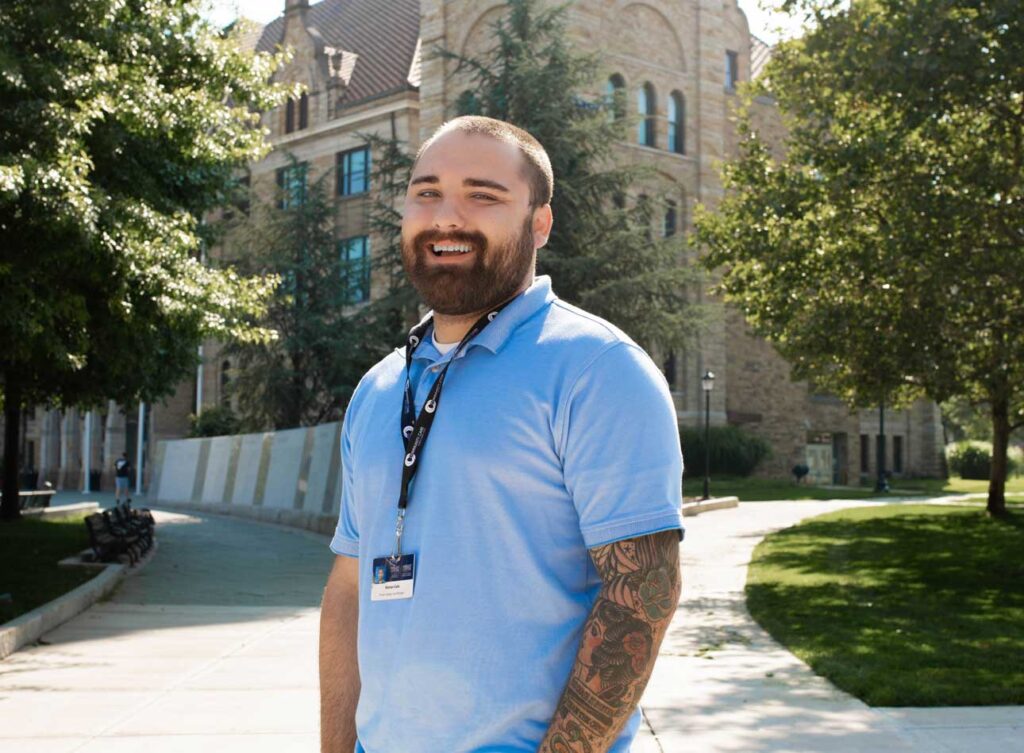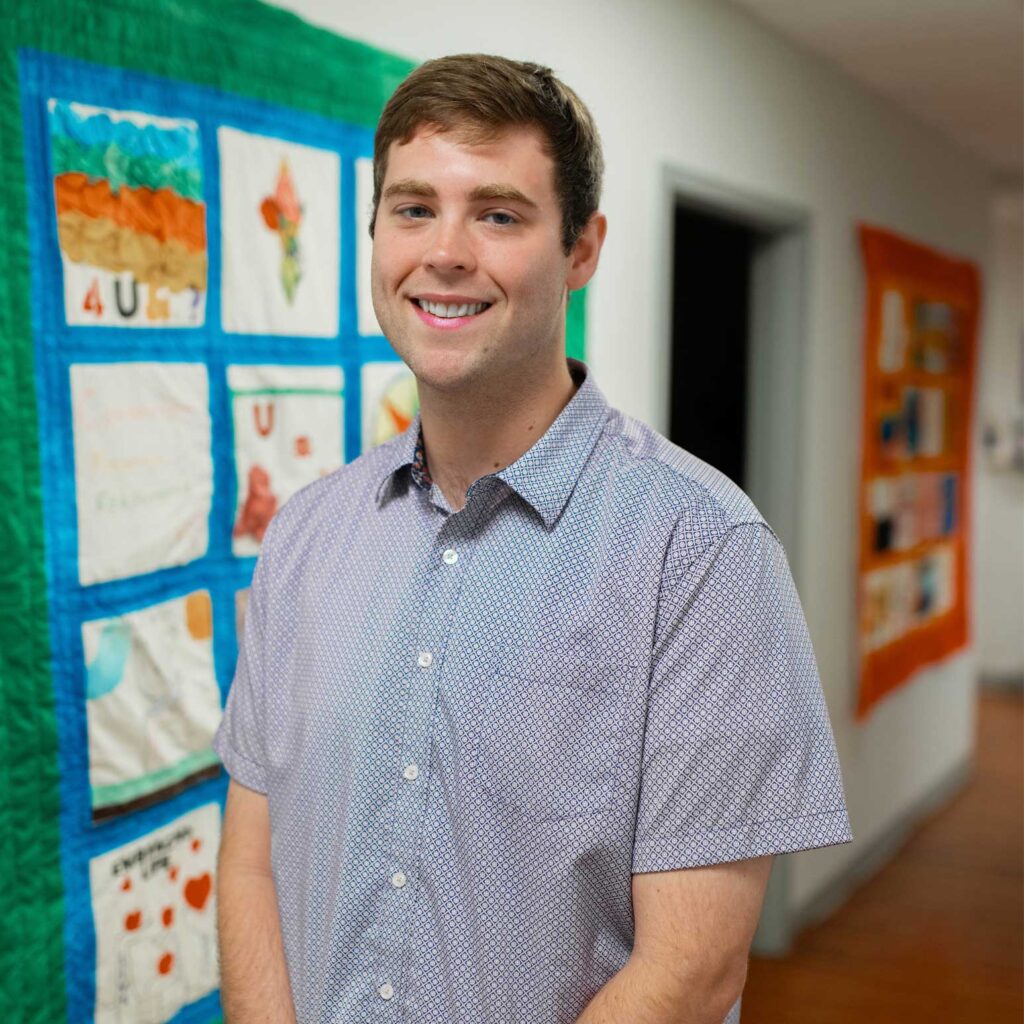Ryan White HIV/AIDS Clinic’s novel program addresses recidivism, overall health

Roman Ealo Jr., a prison linkage case manager at The Wright Center for Community Health’s Ryan White HIV/AIDS Clinic, at the Lackawanna County Courthouse. Case managers serve individuals with HIV and AIDS leaving correctional facilities to return to communities in Lackawanna, Luzerne, Wyoming, Susquehanna, Wayne, and Pike counties.
Prison Linkage Case Management Program helps former inmates with HIV and AIDS as they reenter communities in Northeast Pennsylvania
When Roman Ealo Jr. received word about a local man on state parole with an HIV diagnosis, the man’s future looked grim.
The new client was “skin and bones,” he says. “It was basically a death sentence.”
Ealo got to work, making sure the man received critical health care and a host of other services. The prison linkage case manager at The Wright Center for Community Health’s Ryan White HIV/AIDS Clinic was overjoyed as he watched his client regain 25 pounds while his HIV quickly dropped to virtually undetectable levels.
“It makes me feel great,” Ealo says about one of his first cases two years ago. “The program is working. Let’s see who else we can help.”
In 2017, the Ryan White HIV/AIDS Clinic launched the Prison Linkage Case Management Program to serve individuals with HIV and AIDS leaving correctional facilities to return to communities in Lackawanna, Luzerne, Wyoming, Susquehanna, Wayne, and Pike counties. The program is funded through federal pass-through money from the Health Resources and Services Administration under the U.S. Department of Health and Human Services.
Modeled after similar programs in Philadelphia, Pennsylvania, and developed by Erica Hubert, the Ryan White compliance coordinator, the program has two main purposes: To connect HIV- and AIDS-positive clients to medical care and case management services within 30 days of their release from prison, and to help patients with a variety of needs – from housing to nutritious foods to employment and transportation – to reduce recidivism.
“If they’re not linked to HIV care, they will have poor individual health outcomes, and there is an increased rate of HIV transmission,” Hubert says.

Dan Hammer, a prison linkage case manager at The Wright Center for Community Health’s Ryan White HIV/AIDS Clinic, at the clinic.
Ealo, 29, began working as a prison linkage case manager in November 2020, joining Dan Hammer, 30, who started at the clinic in December 2018.
After receiving referrals about inmates with HIV and AIDS preparing for their release into Northeast Pennsylvania communities, Ealo and Hammer meet with each client to learn more about their needs and how the prison linkage program can help.
For the client two years ago who struggled with weight loss, Ealo found a way to provide free, nutritious Ensure shakes. He also connected him to a dentist at The Wright Center for Community Health for much-needed oral care.
Other clients need help with housing, transportation, or applying for the Supplemental Nutrition Assistance Program, commonly known as SNAP. Clients also might need mental health counseling, help writing a resume, or obtaining clothes for a job interview. The case managers make sure clients keep up with probation or parole requirements, and pass drug tests – whatever they need to succeed in their life after incarceration.
Helping a client find stability as they transition from prison makes it easier for them to focus on their health, Hammer adds. “When you’re living a life of chaos, it’s difficult to take your meds every day,” he says.
Beginning in the summer of 2020, Hammer helped calm the chaos for Henry, a Washington, D.C. native who was diagnosed with HIV in 2007.
Henry was already a Ryan White patient when he was arrested on an assault charge and spent a few weeks in a county jail. After his release, he lost his housing and decided to head to Philadelphia. Before long, Hammer, who had been assigned as his case manager in the prison linkage program, called him to check in.
“I didn’t have any intentions of coming back (to Scranton), and Dan called me, talking about, ‘hey, are you making it to your next appointment,’” Henry says. “I said, ‘man, I’m not worried about that appointment.’”
As they continued talking, Hammer promised to help Henry rebuild his life in Northeast Pennsylvania. After Henry returned to the area, Hammer worked with him to find a place to live and made sure he was keeping his medical appointments and taking his medication. That personal attention allowed Henry to focus on his health and work toward lasting stability. He eventually landed a job at a utility company, married his longtime girlfriend, and, thanks to his care at the Ryan White HIV/AIDS Clinic, has an undetectable viral load.
“The programs at The Wright Center helped in a major, major way. Dan was always consistent about making sure I got to my appointments, just calling to check in and see how I was doing,” Henry says, adding access to the food pantry and assistance obtaining household items for his apartment made a big difference. “It’s not just to make sure you take your medicine, make sure you get to your appointments.
“It’s also like, what else can we do to help you get your life back,” Henry adds
Seeing clients succeed motivates Hammer and Ealo. Both have criminal justice degrees and a desire to help people in the prison system. Hammer became familiar with the challenges inmates faced while completing an internship at a Scranton nonprofit now known as the Outreach Center for Community Resources. Ealo learned about the obstacles former inmates face during an internship at a state prison and while working at a halfway house.
“When I was doing my internship, even when I worked at the halfway house, I saw the need,” Ealo says. “I want to help them out, reduce recidivism.”
HIV and AIDS aren’t spoken about much in prison settings, partly because of the lingering stigma. One of the biggest misconceptions about HIV/AIDS is that it’s a death sentence, according to Hammer.
“It’s a completely livable disease,” Hammer stresses. “Just like diabetes, you can take medication and be perfectly fine.”
Mary Louise Decker, M.D., the infectious disease medical director for The Wright Center for Community Health, says the prison linkage program’s focus on a vulnerable, medically underserved population helps improve communities throughout the region.
“Helping patients to transition back into society is challenging but with the guidance and support of a knowledgeable and skilled case manager, this process can be made easier,” Dr. Decker says. “Erica, Roman, and Dan have provided this service to the community for many years and have had a profound effect on many patients’ lives by assisting with housing needs, helping with reengagement into medical care, ensuring there is no disruption in their medication, and providing guidance in reentering the workforce.”
For more information about The Wright Center for Community Health’s Ryan White HIV/AIDS Clinic or the Prison Linkage Case Management Program, call 570-941-0630.








